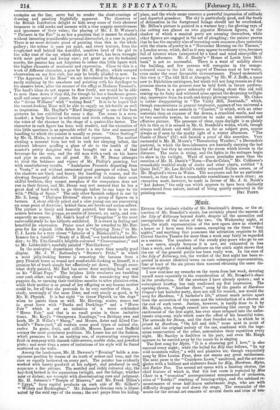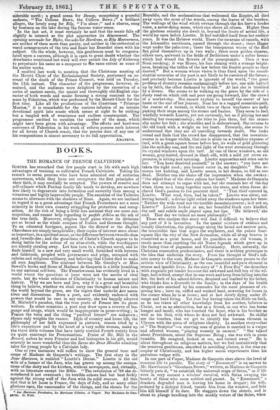Zusir.
EITHER the intrinsic vitality of Mr. Boucicault's drama, or the at- traction of Mr. Benedict's music, has certainly placed the success of the Lily of Killarney beyond doubt, despite all the anomalies and incongruities of the anion of the two. On Wednesday night, at least, the ninth representation of the new opera drew as crowded a house as I have seen this season, excepting on the three "first nights," and anything that possesses the attraction requisite to fill Covent Garden Theatre for more than a week may fairly be regarded as a success. The numbers of the steady play-goers who go to see a new opera, simply because it is new, are exhausted in less than a week, and a crowded audience on the ninth night shows that the ear of the general public has been really won. In the ease of the Lily of Killarney, too, the verdict of the first night has been re- peated in almost identical terms on each subsequent representation, four at least of the six pieces then encored obtaining the same dis- tinction nightly. I now continue my remarks on the opera from last week, devoting myself more especially to the consideration of Mr. Benedict's share in the production. Of the overture I have already spoken; and a subsequent heating has only confirmed my first impression. The opening chorus, "Another cheer," sung by the guests at Hardress Cregan's last bachelor party, does not call for remark, nor would the song for Hardress, "A bachelor's life," attract much notice apart from the animation of the scene and the introduction of a chorus at the end of each verse. Justice, however, is hardly done to it by Mr. Haigh, who, though roused into something like energy by the excitement of the first night, has ever since relapsed into the unfor- tunate sing-song style which mars the effect of his beautiful voice. The serenade for Danny, and the duet founded on it, in which he is joined by Hardress, "On hill and dale," come next in point of order, and the original melody of the one, combined with the inge- nious construction of the other, necessitates their repetition every night. Mr. Santley is faultless in his part, and even Mr. Haigh appears to be carried away by the music he is singing. The first song for Myles, "It is a charming that I love," is also encored every night; while the ballad for Eily that follows, "In my wild mountain valley," a wild and plaintive air, though exquisitely sung by Miss Louisa Pyne, does not create any °c•reat enthusiasm. The next piece is the " Cruiskeen Lawn," unaltered, and the act con- lades with a brilliant and elaborate finale for Bily, Hardress, Myles, and Falher Tom. The second net opens with a hunting chorus, the chief feature of which is, that the last verse is repeated by Miss Chide to a "sensation" accompaniment compounded of orchestra, cries of " Molls !" cracking of hunting-whips, and the subdued re- monstrances of some half-dozen unfortunate dogs, who are with difficulty dragged up and down the stage. The remainda of the music for the second act consists ot several duets and trios of con- siderable merit ; a grand scene for Danny, comprising a graceful andante, "The Colleen Bawn, the Colleen Bawn ;" a brilliant allegro, the lovely song for Eily, "I'm alone ;" and a chorus, sung by boatmen on the lake during the famous water scene.
In the last act, it must certainly be said that the music falls off slightly in interest as the plot approaches its detonate:II. The opening serenade for Myles. the solo for Ilardress, as Eily Mayournees, are neither of them more than pretty, and neither in the orchestral or vocal arrangements of the trio and finale has Benedict risen with his subject. On the whole, however, this gentleman must be congratu- lated upon a success, although it is open to great doubt whether the drawbacks mentioned last week will ever permit the Lily of Killarney to perpetuate his name as a composer to the same extent as some of his earlier works.
I omitted last week to mention that the Christmas meeting of the Motett Choir of the Ecelesiologieal Society, postponed on ac- count of the death of the Prince Consort, was held on Tuesday, the 11th instant. The character of the programme, however, re- mained, and the audience were delighted by the execution of a series of ancient carols, the quaint and thoroughly old-English cha- racter of both words and music forming a strong contrast to the mass by Palestrina, which was performed by the Motett Choir for the first time. Like all the productions of the illustrious " Princeps Muskat," it is remarkable for the curious infusion of an intense devotional spirit into music which seems at sight to be nothing but a tangled web of wearisome and endless counterpoint. The programme omitted to mention the number of the mass, which might have been given with advantage. The efforts and hard-won successes of Palestrina in his work of reform possess such interest for all lovers of Church music, that the precise date of any one of his compositions is almost necessary to its full appreciation. AMATEUR.































 Previous page
Previous page